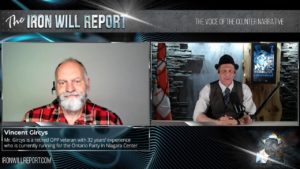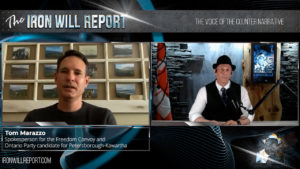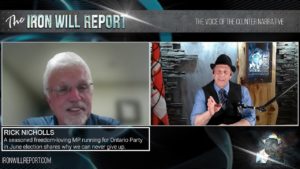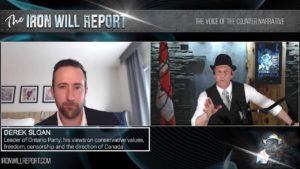Change is in the Mirror | James Topp, Canada Marches
September 28, 2022
James speaks to us from 2 hours east of Quebec City on his current march from Signal Hill, Newfoundland to the Greater Toronto area:
- Does James feel he is being persecuted?
- Why does he keep marching?
- What does James think it will take to win the fight for our rights?
- What are James’ thoughts on Global’s slanderous article about him?
- Why does James never say “Don’t Be Afraid?” and what does he say instead?
Please share on your social media accounts
SUMMARY KEYWORDS
happening, people, james, march, felt, fear, mandates, point, article, speak, canadian, question, posted, policy, continue, rv, white supremacist, mcevoy, public, ottawa
SPEAKERS
Will Dove, James Topp
Will Dove 00:15
My guest today needs no introduction to most of you, James Topp, who drew a great deal of attention by marching from Vancouver from the Terry Fox statue there to Ottawa, in protest of the COVID mandates. James, as many of you know, is a military personnel he has been currently in limbo with them because they had threatened a court martial that’s been covered in previous interviews that’s still up in the air. We still don’t have news on what’s happening with that. James also was working as a civilian for the RCMP and was dismissed from his job there for refusing to reveal his injection status, and is still in limbo, despite the fact that other civilian RCMP employees have been invited back to their jobs. James is joining us now from about two hours east of Quebec City, walking through Quebec on his march from Signal Hill, Newfoundland to the Greater Toronto Area. James, it’s good to have you back.
James Topp 01:10
Yeah, thank you. Well, I just like to clarify a couple of things. So I was being I was in the process of being administratively released from the armed forces on what’s called Code 5-F, as were a number of military personnel who were unwilling to participate in the chief of defense staff policy on COVID Vax COVID-19 vaccination. Furthermore, why I still have not heard back from the public service as to whether or not be returning to work is because there is this is that is the consequences of this protest, and the fact that I have become public like this, and there’s a requirement for them to do an investigation. I am hopeful that when that investigation is complete, I may be invited back to work.
Will Dove 02:14
All right. So we have to start with this question. James, do you feel that you’re being persecuted for exercising your freedom of speech?
James Topp 02:20
I guess it depends. I’ve never really felt that way. I never – persecution. I’m not really sure. use that word. So here’s what happened. So I started back in February, I came out and I I put my uniform on in public, because I thought what was happening with regards to this policy being implemented, was so transparently and obviously wrong in almost every way that it was fear based segregation it’s discriminatory, this policy separating and dividing us from each other, and I spoke out about it. Now, the issue is that I made this this statement in uniform criticizing the government. And that is the crux of the matter. Is at that point, I think a number of us whether you whether you want to do admit it to yourself or not you knew that something was wrong. I think somebody somewhere we are all waiting for that person our governments at the highest levels to make this an obvious statement. Like I mean, this is this is what the protests in January and February were all about the fact that that never happened. Finally, somebody came out and said did something. Whether or not you want to call that the after effects of that whether or not you want to call that persecution or punishment. It’s not something I put a lot of thought into.
Will Dove 04:19
When I asked the question, James, it was more in regards to your civilian position with the RCMP because other civilians working with the RCMP have now been invited back even if they refuse to disclose their vaccination status as you did. So I have to ask once again, ask the question, what’s your take on this with the RCMP is why have they not invited you back to your job?
James Topp 04:38
Well, because like I said, there’s an investigation going on administratively, I might add. And it’s just not really what I’m gonna get into in too much detail, but that is that is the consequence. Like I said, of this march of making my they have to investigate whether or not statements that I made are harmful to the reputation of public service in the RCMP. So like I said this there that it’s not a foregone conclusion that I won’t get invited back to work.
Will Dove 05:25
Right. All right, let’s move on to the reasons why you’ve continued your march. Of course, virtually everyone watching is aware of your original march from Vancouver to Ottawa, where you met with some at least some MPs to present your case to them. What prompted the decision to continue your march from the East Coast.
James Topp 05:41
I think what we saw happen over the course of the march from February, up to June, we saw little to no media coverage. And if it was covered, it was very much on the periphery. I did get some coverage from independent journalism podcasters which was very helpful in getting the word out there. And then as we approached Ottawa we got some traction, we had a meeting on June the 20th, it was announced that federal government workers would be invited back to work. Now I’m not you know, self centered enough or narcissistic enough, to believe that, you know, it was all because of Marches there was a number of things happening. Like, you know, with regards to people speaking out and lawsuits, and other kinds of conversations happening behind the scenes that made that happen. However, I like to think that we were a contributing factor in some way shape or form even though it will never be admitted to. Then we were also told that around that time, some restrictions will be “suspended”. What I saw was the threat of these mandates and restrictions being held over our heads. Furthermore, there was no word on whether Canadian Armed Forces personnel that had been released on item code 5-F which I would like to reiterate stands for ‘Unsuitable for Further Service’. They were found unsuitable because they were unwilling to take part in this vaccination program either by accepting the substance or disclosing their vaccination status publicly so this is one of the things that was still in place for the armed forces. I felt it was an injustice, we’re losing people with valuable training and experience and skilled to this policy, pilots, Special Forces operators and technicians and officers with years and years of experience. So, this is one of the things to be addressed. Keeping the issue alive, like what I saw happening this summer [sound issues] I saw a lot of kind of interest in the matter because you know, some of the restrictions are now lifted and people were kind of…travel…the summer vacation I just bought there was a requirement to keep this issue… by raising awareness by directly reaching out to the Canadian public because it was and I will get into this later there was wasn’t like, what I was saying, or doing was being accurately portrayed in the media and it definitely wasn’t being covered. And the message wasn’t getting out there. So I felt that I needed to address the public directly.
Will Dove 10:04
Okay so you’ll notice that James has now moved inside the RV. As some of you noticed, we were getting a lot of wind there. And this audio was cutting out. So James chose to wait because he wasn’t very far away from the RV. So now he’s in a quiet environment where we can continue this interview. So James, I’m just going to reiterate the question that I’ve asked before. And that is this, that you had made this decision to continue this march from the East Coast in order to continue to raise awareness for the violations of our rights from these COVID mandates. And then the question that I asked from that point was for you, personally. At what point do you feel that this war has been won because there’s still things going on with – the truckers still don’t have their rights back, we’ve still got the ArriveCan app which they’re saying will be optional, but hasn’t happened yet. We still have members of the military such as yourself that have not been brought back to your positions. So there’s still a lot of stuff going on here. So I wanted to ask at what point in time do you feel we have our rights back and we’ve won this war?
James Topp 11:03
Personally, it’s going to take a lot more effort on the part of the Canadian public as a whole that I can’t put a timeframe on that. What I will say is that for us the march will be over shortly, because I believe we have done what we can do to keep awareness of this issue alive in the public mind to clearly educate people on what is happening within the armed forces with regards to the implementation of this policy. And, you know, myself and the team, we’ve been doing this for seven months. So there is now I think, as we approach Ontario, in the next few days, we’ll be crossing over into from Quebec to Ontario on September the 30th. And we will do probably a final meet and greet in the GTA area, on the 30th. And having said that, this is going to be the time when the Canadian public as a whole has to recognize what is happening here. And what has happened, and what is continuing to happen under the umbrella of this, you know, the measures that were brought in under this, this pandemic. So, you know, this is gonna go on for as long as it takes for Canadian people to realize what’s happening at a community level, I think, is that where it’s going to start, people are going to start coming together, after they’ve educated themselves on what has happened, what rights they have lost, and what rights are continuing to get siphoned away. The nature of this policy, how it is based on fear, and it is discriminatory. And we need to come together and from the bottom up, make a change. So until the Canadian people as a whole or at least some, we’ve reached some tipping point where we can say, this is the, you know, the point where we start to turn this around, like, I think it’s going to I can’t put a timeframe on what that’s going to take. It seems to me, though, there is a bit of change in the political winds with regards to the new leader of the Conservative Party. And again, I’m not advocating for anybody here, this is an entirely nonpartisan effort. But it does seem that, you know, people are starting to be emboldened to speak out a little bit more, and this is what it’s gonna take.
Will Dove 14:00
And you made reference, James, to the fear mongering, and of course, I agree with you completely, that this has been the major problem that there’s been so much fear mongering going on, it’s driving the public to cooperate with all of this. And obviously, I mean, I don’t want to put words in your mouth. So I’m gonna make it clear, these are my words, I think we’re currently living in a country where our governments can run completely off the rails to the point where a lot of what they’re doing would be construed in my mind as treason. And we’ve got the cooperation of the mainstream media, spreading this fear mongering, and they’re still doing it. And this is where I want to get into this lawsuit that you have launched, I think, quite justifiably, against Global News, for libel, for suggesting very strongly in a recent article that you are a white supremacist. And folks, we’re going to put up a link to that article, because you really should read through it, it’s, I gotta tell you, I think it’s one of the most planned libel pieces I’ve ever read. Because the way they’ve worded it was very clever. They went in here, and they talked about you being part of this march and the March being associated with demonstrations in Ottawa, and that the organizer of those demonstrations, had been accused of posting anti Islamic sentiments on social media. But you have to read through the article to realize the person they’re talking about is not you, but rather one Stephanie McEvoy. So what they’re doing is they’re trying to create this association in people’s minds. And I have no idea whether or not Miss McEvoy has ever posted such things. Given the state of our media these days, I’d probably suggest probably not but just the same, let’s forget that for now. The point that I’m making, is they’ve gone to great lengths to associate you with this accusation. I have to ask, aside from the obvious that you’ve, you’ve launched a libel lawsuit against them. And once again, we’ll post the link to that, folks, as well, because you should read that document. What’s your feelings on this, James, that you’ve gone and you’ve done all this, you’ve walked three quarters of the way across this country, you’ve done a great deal to raise awareness. And I do believe by the way that the change that was made on June 18, was a large part due to your efforts and the awareness that you raised. And if you’ve done all of that for Canada, and now you’ve still got the mainstream media libeling you.
James Topp 16:22
Well, I, to say that, based on what I saw happen, and the portrayal of the protesters and the truckers in Ottawa, and all of the events leading up to it. I expected to have this kind of treatment from the corporate media, so was specifically I can speak to CTV, CBC and Global News. And, to a lesser extent, National Post, Globe and Mail, The Sun also – the Ottawa Sun, there was a couple of articles put up about there. But up to like I said there was largely no coverage for it was done very much on the periphery. And then the closer we got, the more muscle power started going into this kind of derogatory reporting. In no way was I ever, most of the time when there was an article put out, I was on not often consulted with regards to my comments or anything. Articles were just written about me, like I said in this kind of derogatory way. So I expected it to happen. But then this latest one, when it was brought to my attention, what immediately jumped out at me was in my in the URL for which typically, most people I don’t think notice, however, it is, the address posted in my name appears next to far right, white supremacist. And that to me is indicative of an attempt to again, associate my name with those terms, I am in no way shape or form a white supremacist. This concept of far right needs to be explained to me so that I understand exactly what that means. I don’t know what the definition of that even is. This is again, like you pointed out this article is poor journalism, and this is no disrespect to the author. However, again, neither was I consulted. And my name is flung about in this article to associate myself with Miss McEvoy, who I might add was not the organizer, whatsoever, of any – or anything to do with that March, I’m not really sure where she came upon that information. So again, this is the point where I felt that, you know, having expecting this treatment, but having to experience it directly and be at the center of it. This was the point where I thought, you know, this is where we have to start standing up for ourselves. This is, like you said, cognitive conditioning, as far as I’m concerned, there is this article with all kinds of names and other organizations thrown up in the air with images posted so that you have this concept in your mind that when you see me and my name, the first thing that comes into your mind is something of this libel is definitely defamatory label. It is it is difficult to spot unless you’re used to pointing these things out or picking them out. But that is what I saw happening there. This is the point where I consulted a number of people I didn’t just you know, become you know, this wasn’t a result of oversensitivity on my part, I felt that this was a direct impingement on my reputation. I asked a number of different people, including the lawyer who we ultimately ended up retaining what their thoughts are. And they felt that there was a case there. So we have, we have done what we need to do to get the funds, litigation is prohibitively expensive. So we are crowdfunding. And this is not to silence anybody. This is to ensure that there is proliferation of free speech because I don’t feel that free speech is in play when a corporate organization that has a stranglehold on the information landscape is able to publish whatever they feel without having to feel that it’s necessary to consult the person they’re writing about. So this is where I stand on the issue. This is in a small way how we’re going to push back on this. And this is again to mitigate the reputational harm. And furthermore, this is to ensure my physical safety, I’m the one marching, I’m the one putting myself out there with my team I should say. And we’re at a point now where this kind of inflammatory article is what enrages people and the last thing we need is to have somebody read something like this get behind the wheel of a car on a bad day and they happen to see me marching on the side of the road. This is this is there’s a couple of different things happening here.
Will Dove 21:34
Yes, and I agree with you completely. Now, let me give you a piece of information that you might not have. While I am not a lawyer, I was a web developer professionally for years. And I can tell you that if you put those tags, white supremacist, far right extremist, your name, all into the URL, that is not an accident. Anybody who has most basic knowledge of the web knows that when you put those tags right into the URL, you just made that extremely visible to search engines. This is not a mistake, now they’ve changed it. And I think they probably changed it in an effort to try to avoid this libel suit, I hope that you’re going to continue to pursue it because I personally don’t think that this article was – I’m gonna use the term poorly written. I think it was very cleverly written, it was written in such a way as to make these suggestions. But hopefully to avoid libel, they didn’t do a good enough job. But they certainly tried. So I wanted to ask you this next question, James, because earlier, you made reference to needing this ground up change in our society and Canada. A statement, which I agree 100% with, to the extent where I’ve done two interviews now with Sam Bushman, who is the vice president of the peace officers, the Constitutional Peace Officers Association of America, where because I believe what we need to do here is we need to start out with elected sheriffs in this country, because that’s the lowest level of elected officials. And if we had that if we had sheriffs who were elected, and their job was, yes, to keep the peace, but also to protect our constitutional rights, we would see things happening in Canada, much as what’s happened in some places in the states where the sheriffs have said, well, you can try to put these mandates in place in my in my county, but I’m not going to enforce them. Now, that’s just my idea. What I wanted to know, James is when you talk about ground up changes, what’s going through your mind.
James Topp 23:25
Yeah, nothing in even remotely similar to what you’re talking about. What I think that in a Canadian fashion here is what we need is people at their community level, what I have observed in this country over the last seven months, is overwhelmingly positive support, the number of times that we’ve had negative interactions, I can count on two hands. And I’m saying that after meeting 1,000’s of people now. But what I continue to experience is number of people who are uninformed about what I’m doing, and not that I am doing this for any kind of fame. It’s just because of the media blackout. And there is there is apathy and indifference. And this is not an insult to anybody I can understand it. I think that we were all subjected to that in some way, shape, or form, when all of this started, but in order for us to make this bottom up change, it’s going to take people first of all to activate at the individual level, they are going to need to look in the mirror, they’re going to need to make come to a realization of what’s happening here. And one of the reasons why I felt it was necessary to speak out and take this sort of peaceful demonstration. Because if we let this go on it, you know, this authoritarian system will take more and more away of our of our rights and freedom. So it’s going to take realization at the level of the individual and then reaching out to other individuals to make the case for change. And that change comes in the lowest levels in as small ways of getting involved in something like city councils, school boards, coming together in some sort of community union, to push back on policies in which when these things connect together at grassroots levels then you’re gonna start getting the change that you need to see happen with regards to voters now being educated enough to make informed decisions and being discriminating and willing to engage with some critical thinking as opposed to succumbing to the kind of hot button emotional issues that we get presented with in the in the corporate media. So this is the kind of ground-up change that needs to happen. It’s going to take a while I think for this kind of network to develop, and for people to come to these realizations, but I do think it’s going to happen. It’s I will say that is the corporate media, I think is undermining its own credibility in many different ways. The statements that many officials may have made, I think, when looked through the lens of objective reality can be seen as ridiculous, they are, again are at the point where these things alone should start to bring people to the realization that it’s time for them to engage using their own minds and their own common sense. And having they have to understand that they have the ability to educate themselves. And doing that they can have conversations and, and engage in a way and systems to make the change from the bottom.
Will Dove 27:05
Alright, so I wanted unless there’s more you wanted to discuss in terms of your march or this libel suit, I do have a final question for you. But before we get to that, is there anything else that you wanted to cover?
James Topp 27:17
No, I don’t think so. Like, I would like to put it out there for people to understand that this March is going to come to a conclusion. More than likely, the way we have it planned right now, by the end of this month, cross over into Ontario, head down into Toronto to have one final meet and greet, which we are going to advertise in a couple of days. I’m not really sure when this interview will go out. But when that happens, you know, we have, you know, had these conversations here and the team, with the team with the folks helping us with online, managing our social media presence. And this is this is where the Canadian people now have to, you know, everybody, I think who has been negatively impacted by these mandates, including those personnel who have been, let’s call them 5-F’d from the armed forces, they need to start I think, you know, speaking up speaking out, making their, their turmoil, other people are aware of what they’ve gone through. This is the psychological stress and trauma that has been imposed on those folks. It’s, it’s immeasurable, okay, it’s something that that should be acknowledged by the public at some point in time. So they’re gonna have to now take up this baton, if you will, and carry it forward.
Will Dove 28:48
All right. Thank you, James. So for my final question, it has to do with the nature of fear and courage, something that I know you’ve got a great deal of experience with having served in the armed forces under fire, having put your own life at risk. I have said many times since the beginning of this fight, because I’ve been in it myself now for over two years. That courage is not the absence of fear, it is action in the face of it. Now, I agree with you completely, that the change in this country needs to come from the ground up, it needs to start with the people. But the people have been afraid to speak out because of the fear mongering because of the enforcers that may take away their jobs, and they hand them fines, whatever. So your experience of fear and courage goes beyond anything I have ever faced. I’ve never been shot at. I’ve never served in a war. And I know that many of our viewers would like your views on that very issue of fear and courage and how do people practically speaking, find the courage to step up? And do what needs to be done?
James Topp 29:50
Yes, and good question. So the issue is that folks need to understand I will never say to anybody, just as just as a just to say, for comfort’s sake, you know, don’t be afraid that’s not that’s that doesn’t work. We are we’re human beings, we are hardwired to feel fear. It’s part of our survival mechanism. So you negotiate it, you understand that it is a part of you, and you take action to kind of understand how it is hampering your ability to move forward. And like I said, it’s, it’s a something that is part of our human experience. Fear is, is what prevents us from, you know, falling off a cliff face, you know, it’s it does help us from time to time, but occasionally, especially in this era that we live in, and the way that it has been used against us, is definitely preventing us from coming together and making the change that needs to happen. And what I would say to them is that my experience with it, in overcoming it and managing it, it has always been to look to the example of others. And this is what you know, to use the example that I sometimes use when I’m having these public meet and greets is that there was a time in my career when I was a paratrooper. I was I was taught how to jump out of an airplane. Then take all the actions necessary to get to the ground safely was after your parachute opened and if – what to do if it didn’t open? These things didn’t happen in overnight, there was training involved, there was coaching, I looked at the example of others, I had people helping me. And in that way, I can say that this is kind of similar to the way this March happened. You know, there was folks who came, you know, I looked to the examples of others, I felt it was necessary to speak out, in the same way people had been speaking out for almost two years. You know, they – I looked to the example of Daniel Bulford, for example, Kristen Nagle, a number of other people, I felt it was my turn now to say and do something people came to help me with this. So there is a point of time when you acknowledge the fear that you have within you, you look through the example of others, you use it if you can, and then it’s also start small, I didn’t just put my uniform on out of the blue and then go out. When I saw these policies being put into place, I started with a letter. And, you know, most people would say, that’s not enough, that doesn’t do anything. For me personally, that was how I started to edge out of that, that being trapped in that bubble of fear, you know, I just wrote a simple letter, clear, concise, polite, to the point, indicating my displeasure at the impact these mandates were having. And, you know, it was acknowledged. And what happened after that was I encouraged other people to write letters. And they, you know, not long after I started this March, and we was those letters that got me that meeting with members of parliament. So you, you recognize what’s happening within you with regards to fear. You look to the examples of others, you start small, and then you can you can build on that. And don’t forget, when I started this, too, I thought this was going to be a one man show. But I realized fairly quickly, it wasn’t going to work like that I was going to need the help from others. And it was that help and encouragement that I got from people on the team and on the ground, as we went across the nation that, you know, helped me overcome that that fear.
Will Dove 33:50
Very well said, James. And I think I can echo that myself. When I started this organization. I thought it was going to be a one man show. I am now very humbled to have an entire team behind me helping me in this fight just as you are. And so I think what I’d like to add to what you’ve said is this. James is absolutely right. Find some small thing that you can do. Maybe it scares you a little bit, but do it anyways. And maybe you’re not a leader, okay? If you’re not, there’s leaders out there who you can help. And maybe just maybe in the process of doing that small thing, you’ll do another thing and another and you’ll discover that you are a leader, and other people will join and follow you. So James, I want to thank you for taking that leadership role for setting the example that other people can follow.
James Topp 34:37
Thank you, Will.
Want Your Country Back?
We are in desperate need of monthly recurring donations so we can hire assistants to create more tools in a timely manner. Donate below!
Can You Donate Monthly?
Please consider making your donation monthly. This allows us to make commitments to produce tools and content we otherwise cannot.









